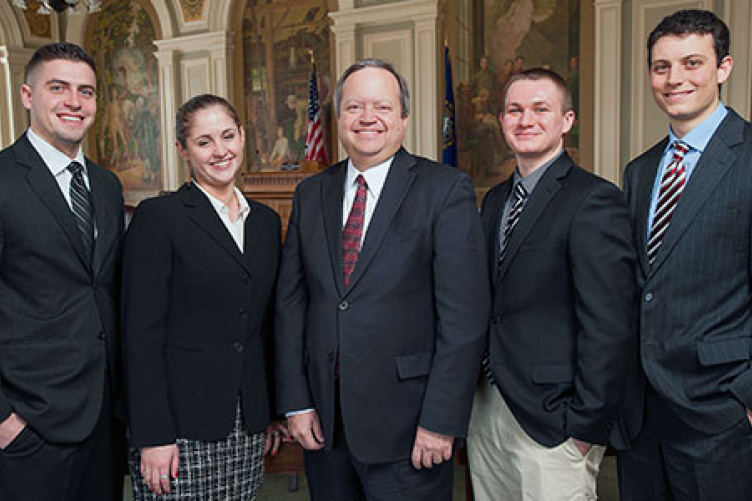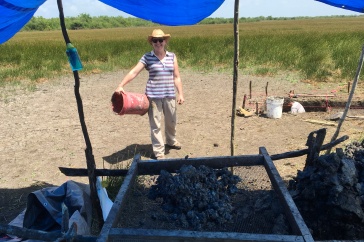
This year’s Concord interns join N.H. Senate President Peter Bragdon in the Senate Chamber. Left to right: Dan Zotos ’14, Erin Ryan ’13, Bragdon, Tyler Clark ’13, Steve Naffah ’13. VIEW SLIDESHOW >>
In the New Hampshire State House, UNH intern Erin Ryan ’13 scurries past portraits of distinguished politicians, pushing a wheeled bookcase loaded with reference materials for Senate bills.
Around the corner, in a crowded committee hearing room, intern Steve Naffah ’13 jots notes as the day’s final testimony on casino gambling concludes.
Tucked into a side office, intern Dan Zotos ’14 composes correspondence with Senator Peggy Gilmour.
And, earlier this morning, intern Tyler Clark ’13 glimpsed Senator David Watters testifying before the House Public Works and Highways committee. Soon, Clark knows that his research and talking points will inform senatorial testimony.
Meanwhile in the main hall, car dealership employees and lobbyists, wearing their requisite orange badges, mill about waiting for their committee hearings to begin. Union workers in green t-shirts head for the hearing in the House Chamber along with townspeople and a gaggle of fifth graders. While the legislature is in session, this constant flux is just business as usual.
For about 30 years, UNH students have worked as Senate interns at the State House as part of the Concord Internship. They provide critical support to the 24 Senators who keep pace with an ambitious legislative docket that keeps them and the 400-member house busy.
Actually, most of the interns work for several senators and follow at least two committees. It is a baptism by fire. But interns find that their work does not go unnoticed. Recent graduate and former intern Mallory Chandler ’12 now works part-time in the Senate Clerk’s Office. Marissa Chase ’12, also a former intern, managed Senator Gilmour’s successful reelection campaign and now works full time in the Governor’s Office.
Tama Andrews, a lecturer in political science, directs the Concord Internship and has the kind of political radar that can only come from experience. Andrews has worked as a legislative assistant to the Governor, Office of the Speaker, Department of Education, and N.H. Public Health Services, and she has been a consultant on numerous political campaigns.
At the internship’s weekly Practicum, Andrews’s teaching style is seemingly casual. But, as her students soon learn, it’s best to take notes.
In addition to their weekly journals, short papers, and a final paper detailing legislation that they’ve tracked, the interns read policy information and analyses specific to New Hampshire and general articles and monographs on state governments and legislatures. After all, to understand New Hampshire and the national puzzle means studying how states work.
When Andrews outlines what the interns, all political science majors, can expect their first week at the State House–the dizzying corridors and tunnels, research forays, acronyms, thick legislative language, and their committee and senatorial assignments–the students look doubtful.
“Don’t sweat it,” she advises. “Ask questions!”
She adds with a grin: “Hey, what a session you guys have ahead of you. There’s a budget, a new House, a new Governor, and there’s the UNH mission. But you know you’re there to offer nonpartisan assistance with the legislative process, not to further your own opinions, right? Besides it’s a bunch of really interesting people. No one’s there for a career at $100 a year.
“And remember,” she reminds them, “keep an eye out for a bill to follow. Or, find a policy area or maybe just a bill with buzz.”
“I’m Just a Bill”
They got their assignments, made zillions of folders, and learned how to find information, fast. As Clark, who works for Senators Watters and Pierce, summarized the work: “I sign them into bills, drop things off, make calls, answer e-mails, write up resolutions, write newsletters, do research, organize files and binders, etc.” He is also, as are the other interns, assigned to two committees: “For those I make copies, write up spreadsheets, and assist my legislative aides with anything they ask for.”
His most challenging task is for Senator Reagan regarding HB 573, the medical marijuana bill. “I’m comparing the New Hampshire bill to the Maine legislation,” says Clark, a member of Young Americans for Liberty and UNH NORML/Students for Sensible Drug Policy. He plans to track this legislation in order to gain first-hand understanding of the reform process.
Ryan works for Senator Fuller Clark, prime sponsor of the Granite State farm to plate bill (SB 141). She has already done a lot of research for the bill and plans to track it. “My father is a food distributor for small farms, including the N.H. Mushroom Company,” says Ryan.
Naffah works for Senators Sanborn and Forrester and others. “I decided to follow SB 126, the dealer’s bill of rights, which is sponsored by Senator Sanborn,” says Naffah. “The bill makes sense to me. It governs the relationship between the manufacturer and the dealer of automobiles, in order to protect the dealers from unfair manufacturer demands.”
Meanwhile, Zotos has not yet decided on a bill. “I’m working with Senators Lasky and Gilmour along with Senator Soucy,” says Zotos. “My two committees are Energy and Natural Resources. I’m doing a lot of research on topics ranging from gas initiatives to commercial shrimp licenses, and I love it.”
All of the interns have changed their view of state government. “I had never thought about a career in state government,” says Ryan, “but now I’m open to the idea of a job at the state level.” Others, to their surprise, have found that being a lobbyist has great appeal. And, of course, there’s law school.
But more than anything else is a new respect for what governance is about. “What’s impressed me is that it really is a local government,” says Naffah. “It’s surprisingly open. Members of the public regularly attend the same meetings that I do and give their input on these bills before they are acted upon.”
Originally published by:
The College Letter, Newsletter for the College of Liberal Arts
-
Written By:
Staff writer | Communications and Public Affairs



















































